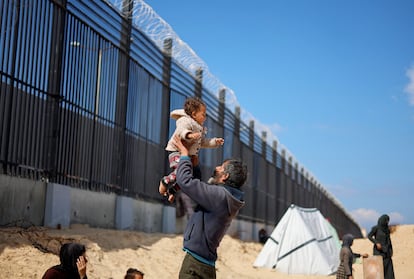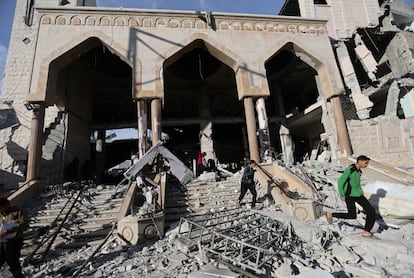Egypt ramps up border security in the face of Israeli assault on Rafah
Cairo, fearful of a mass expulsion of Palestinians to its territory, has deployed the military near the Strip and reinforced the barriers on the frontier

Egyptian authorities are rushing to militarily reinforce the border area with Gaza as Israel prepares to extend its devastating military operation to Rafah, the southernmost urban center in the Gaza Strip and the only city that has not yet been assaulted by Israeli ground forces. The reinforcements ordered by Cairo have been particularly visible since the beginning of the month. The aim of the deployment is to consolidate Egypt’s position on the border and prevent a massive expulsion of Palestinian refugees into their territory.
The United Nations agency for Palestinian refugees, UNRWA, estimated in early February that about two-thirds of the 1.7 million displaced persons in the Gaza Strip (75% of Gaza’s population) were crowded in the Rafah area. The humanitarian situation in the area is marked by an acute shortage of drinking water, food, medicine, and shelter, which has pushed thousands of Gazans to settle in tents erected a few meters from the border fence with Egypt. Despite the fragile humanitarian situation, Israeli Prime Minister Benjamin Netanyahu said on Saturday that he had ordered plans for an assault on Rafah, but so far no plan to evacuate those trapped there has been detailed.
Faced with mounting pressure, Egypt has over the past two weeks sent some 40 tanks and armored personnel carriers to the northeastern Sinai Peninsula to bolster security along its border with Gaza, two Egyptian security sources told Reuters news agency. The Sinai Foundation for Human Rights, a local organization, has also detected the activity of an Egyptian helicopter flying over the border area and released images of the installation of three layers of barbed wire on top of a recently constructed Sinai-Gaza separation fence. Egyptian authorities are also erecting brick walls at the border at intervals, sources in Rafah and Egypt told the independent Egyptian media outlet Mada Masr.
“The Egyptian security measures on the Gaza border are the highest provided for in the specifications stipulated in the security annex of the 1979 Egyptian-Israeli peace treaty, both in terms of surveillance measures and the level of readiness of the security services,” says military expert and retired Brigadier-General Samir Ragheb.
Currently, there are three barriers along the Egypt-Gaza border. The most recent of these — a concrete wall about six meters high — was erected late last year after work was carried out on one of the two walls that were already in place, according to the Sinai Foundation. Strips of earth were also dug about 200 meters from the fence. Over the past decade, as part of a broad anti-terrorism campaign in northern Sinai and the tight blockade of Palestinian territory, the Egyptian army has erected another iron and steel fence and another concrete wall, which is six meters high and dug six meters deep underground. Behind this, Cairo has established a three-mile restricted zone into which only military, police, and border guard forces are allowed to enter.
Shortly after the start of the Israeli military offensive following the October 7 Hamas attacks, the Egyptian army also sent military reinforcements to the border area, reports the Sinai Foundation, but it is unclear whether these units are still deployed. In the early days of its military operation, Israel bombed the Rafah crossing on several occasions and, on at least one occasion, shells hit Egyptian territory. In recent weeks, Israeli aircraft have again intensified their activity in the Rafah area and so far in February they have struck targets close to Egyptian soil on at least six occasions, according to the same organization.

Cairo’s red lines
Over the past decade, Egyptian and Israeli authorities had grown closer, primarily because of the relatively calm security situation in the Sinai and Gaza, but the scope and devastation of the current Israeli offensive has severely strained their relationship.
In recent months, Cairo has publicly drawn two red lines in the face of Israel’s advancing military operation. The first is a mass expulsion of Gazans to the Sinai. Egypt categorically rejects this because it does not want to be complicit in the ethnic cleansing of the Gaza Strip and because it would undermine the Palestinian right to create a state that includes Gaza. It could also turn Sinai into a base of operations for armed Palestinian resistance factions. Occupation of the narrow corridor along the border, the status of which is regulated by the 1979 peace agreement between Egypt and Israel, is the second.
Cairo has avoided clarifying the measures it will consider if Israel crosses any of these lines, but Egyptian sources have leaked to local and international media that one possible response is the withdrawal of its ambassador in Tel Aviv, a step Cairo took in 1982 following the Israeli invasion of southern Lebanon, and again in 2000 for its repression of the first Intifada. U.S. and Israeli officials have also privately indicated to regional media that Cairo has conveyed to them its intention to directly break off relations with Israel, deploy larger military forces on the border, or suspend the peace treaty if Israel pushes Gazans into the Sinai.
Despite this, senior officials from both countries have maintained channels of communication to address bilateral issues and Egypt is heavily involved in mediation with Hamas. In this regard, an Egyptian delegation traveled last week to Tel Aviv to address the situation in Rafah and to try to maintain some level of cooperation, according to The Wall Street Journal. A new round of high-level negotiations on a possible ceasefire is scheduled for Tuesday in Cairo, according to Israeli media.
“The current [Egyptian] security alert aims to ensure security according to the terms of the peace treaty and to prevent the displacement of Palestinians,” says Ragheb, who is also the director of the Cairo-based Arab Institute for Strategic and Development Studies. “The issue would be different if Israel launches an offensive operation on Rafah without evacuating civilians or coordinating with the Egyptian side,” he adds, as this “would be considered a violation of the peace treaty and would give Egypt the right to break that agreement and deploy military forces.”
Sign up for our weekly newsletter to get more English-language news coverage from EL PAÍS USA Edition
Tu suscripción se está usando en otro dispositivo
¿Quieres añadir otro usuario a tu suscripción?
Si continúas leyendo en este dispositivo, no se podrá leer en el otro.
FlechaTu suscripción se está usando en otro dispositivo y solo puedes acceder a EL PAÍS desde un dispositivo a la vez.
Si quieres compartir tu cuenta, cambia tu suscripción a la modalidad Premium, así podrás añadir otro usuario. Cada uno accederá con su propia cuenta de email, lo que os permitirá personalizar vuestra experiencia en EL PAÍS.
¿Tienes una suscripción de empresa? Accede aquí para contratar más cuentas.
En el caso de no saber quién está usando tu cuenta, te recomendamos cambiar tu contraseña aquí.
Si decides continuar compartiendo tu cuenta, este mensaje se mostrará en tu dispositivo y en el de la otra persona que está usando tu cuenta de forma indefinida, afectando a tu experiencia de lectura. Puedes consultar aquí los términos y condiciones de la suscripción digital.









































